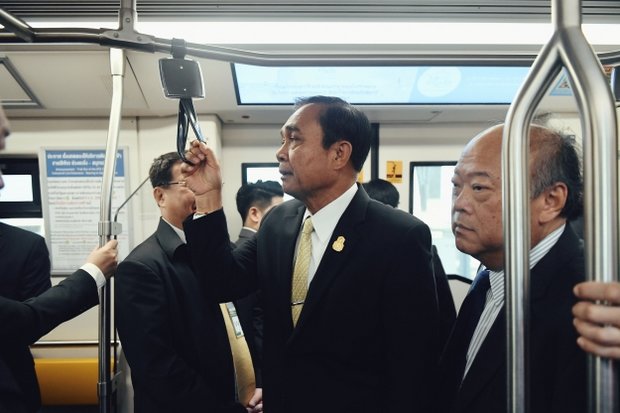
Since Prime Minister Prayut Chan-o-cha inaugurated the opening of the BTS Green Line Skytrain system's southern extension on Thursday, Samut Prakan residents may now find it more convenient to commute to Bangkok for work. But I have doubts about how many of them can afford it.
Weeks before the launch, Bangkok governor Aswin Kwanmuang promised the fare of the 60-kilometre Green Line including extensions would be capped at 65 baht -- a sum he thought appropriate given the cost of living in the city.

Sirinya Wattanasukchai is a columnist, Bangkok Post.
In an interview, he claimed he had already done commuters a big favour by asking the BTS operator to cap the maximum fare at 65 baht, instead of letting it use a distance-based fare system which would result in a maximum fare of 142 baht.
Meanwhile, last week, Deputy Transport Minister Pailin Chuchottaworn announced that the capped fare for the MRTA Purple Line will be 70 baht, saying it is appropriate for the capital and that the service will inspire motorists to give up their cars and take public transport. "You can't get the same price as a motorcycle taxi ride," he told the media.
How can policymakers think a public transport return ticket that costs about half the daily minimum wage is appropriate? How could the deputy minister compare the train service to motorcycle taxis that commuters are forced to use due to insufficient public transport?
It's clear that not every one of the 15 million people living in Bangkok and its peripheral areas including Samut Prakan and Pathum Thani can afford the electric train fares. To get a picture of how disproportionately Bangkok commuters are forced to pay for train services, let's have a look at the cost of using public transport in other major cities:
According to priceoftravel.com, which is quite updated, Bangkok's train fares are higher than those in Singapore, Seoul and Istanbul. Our single-trip ticket costs about the same as in Taipei and it is only cheaper than New York City's subway tickets, which cost 100 baht each and offer unlimited transfers.
The website also shows Tokyo's one-day metro pass costs 179 baht and Paris' costs 254 baht. In Amsterdam, a 24-hour pass that's valid for both trams and buses is 290 baht. Meanwhile, Berlin's 270-baht one-day pass allows people to use all types of public transport -- underground and above-ground trains, buses and trams.
However, the minimum wages in the above-mentioned cities are far higher than Bangkok's. A Taiwanese and a Berliner, for instance, would have to work about an hour to buy a one-day pass. A cleaner in Singapore who earns 24,000 baht a month should be able to afford the subway.
In Luxembourg, the prime minister who was sworn into his second term on Wednesday pledged to make public transport free by 2020. Starting from last summer, commuters aged under 20 get free rides while those who are older pay less than 80 baht for a ticket that is valid for two hours, a period long enough to travel around the country whose size is just about twice that of Bangkok.
These major cities keep the fares for public transport low to make it a genuine public service, either by granting state subsidies or allowing the operators to generate a major source of revenue from commercialising space surrounding the stations rather than relying on ticket sales. But the BTS fare structure is designed in a way that transfers almost all the operational costs to commuters.
In exchange for capping the BTS fare at 65 baht, Pol Gen Aswin offered the operator a 10-year extension to its existing 10-year concession. The operator has to shoulder debts resulting from construction, worth 100 billion baht in the first half of the concession period, and also pay rental costs to City Hall.
The governor may think the construction costs is a big deal. He may forget that the BTS operator recently announced it expected its revenue to grow by 200%, from 17 billion baht last year. According to its five-year plan, annual net revenue should grow by about 25%. Of course, the goal of doing business is to maximise profits, but the BMA has allowed the operator to increase fares almost every year.
However, we are hearing some good news. The MRTA will work with the National Housing Authority in Samut Prakan to find an 18-rai plot of land to build a social housing-cum-parking project. This initiative will at least allow a group of low-income earners to live near the train service.
But the Bangkok governor or the regime could do more by making train fares affordable for all.
